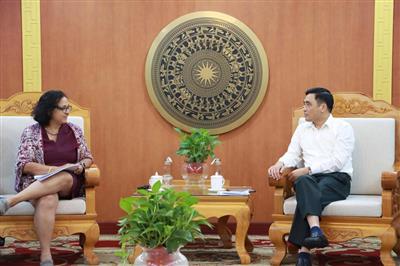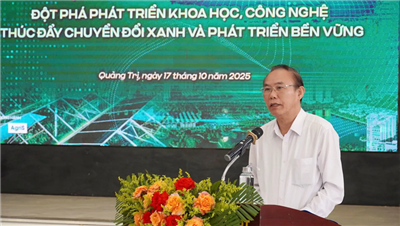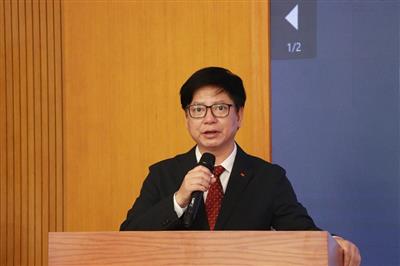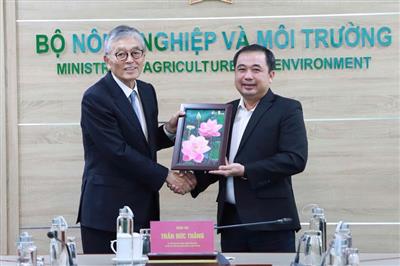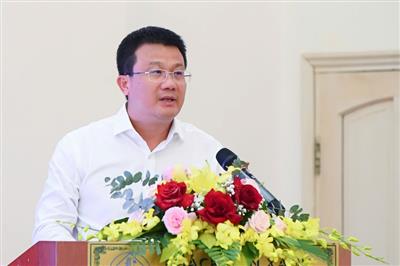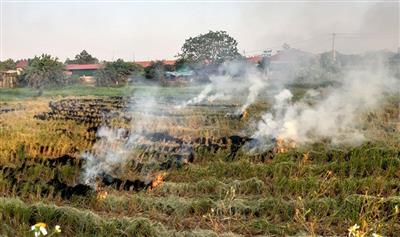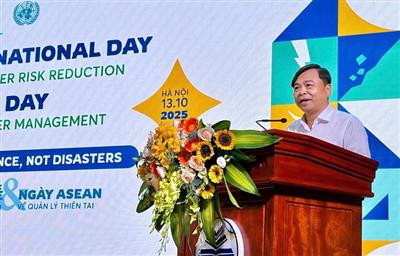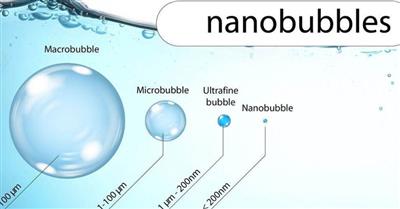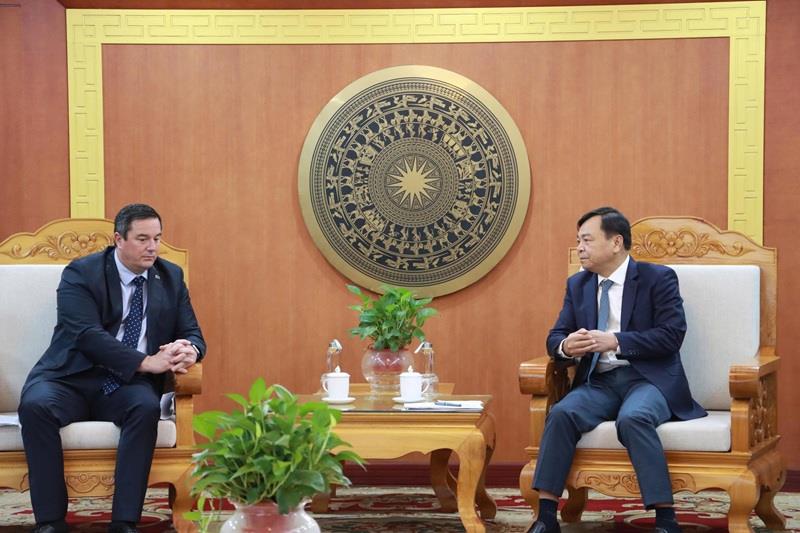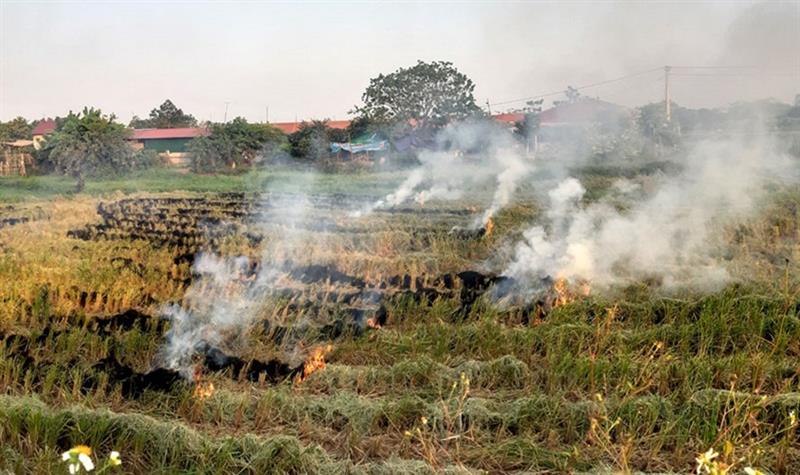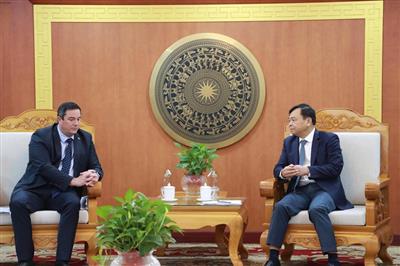
From soybeans to sustainability: Vietnam and the U.S. deepen agricultural cooperation
19/06/2025TN&MTSpeaking at the ceremony "USSEC’s 30 years in Vietnam: Sustainable solutions with U.S. soybeans," held on June 18 in Ho Chi Minh City, Deputy Minister of Agriculture and Environment Hoang Trung emphasized that the partnership between Vietnam and the U.S. Soybean Export Council (USSEC) stands as a prime example of effective public-private collaboration, uniting government agencies, businesses, and industry organizations toward common development goals.
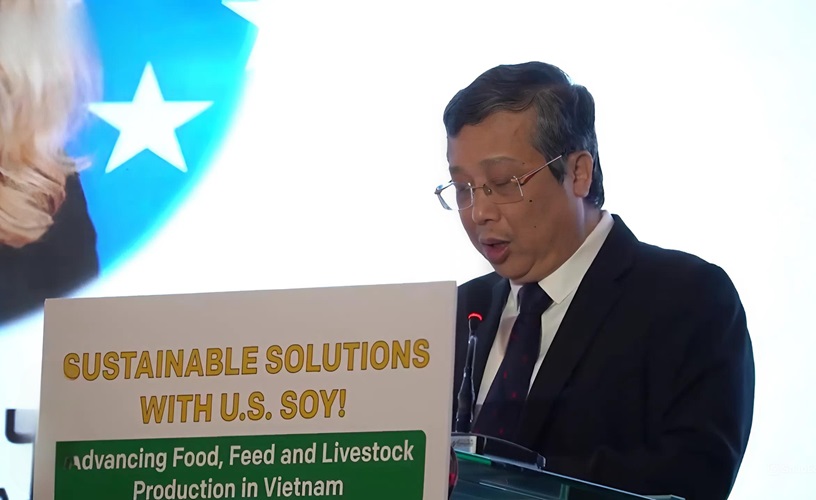
Deputy Minister Hoang Trung highlights USSEC–Vietnam partnership as a model of public–private collaboration at the June 18 ceremony in Ho Chi Minh City
Speaking at the ceremony "USSEC’s 30 years in Vietnam: Sustainable solutions with U.S. soybeans," held on June 18 in Ho Chi Minh City, Deputy Minister of Agriculture and Environment Hoang Trung emphasized that the partnership between Vietnam and the U.S. Soybean Export Council (USSEC) stands as a prime example of effective public–private collaboration, uniting government agencies, businesses, and industry organizations toward common development goals.
According to the Deputy Minister, Vietnam’s agriculture sector is undergoing a profound transformation centered on three pillars: climate-resilient high-quality crop varieties, the adoption of digital technologies and artificial intelligence, and the development of circular, low-emission value chains that utilize agricultural by-products. The overarching goal is to position Vietnam as a globally competitive, carbon-neutral agricultural power by 2050.
In this transformation, the Ministry highly values USSEC’s role—not only as a consistent supplier of high-quality raw materials but also as a strategic partner in technology transfer, innovation promotion, and the dissemination of sustainable development values. U.S. soybeans have significantly contributed to lowering production costs, improving the quality of animal and aquaculture feed, creating millions of jobs, and enhancing food security in Vietnam.
The Ministry also affirmed its commitment to facilitating trade and investment by U.S. agribusinesses in Vietnam while expanding cooperation in research, development, and the building of green and smart agricultural supply chains.
New MoU signals deeper Vietnam–U.S. public–private cooperation
A highlight of the ceremony was the signing of a Memorandum of Understanding (MoU) between the Partnership for Sustainable Agriculture in Vietnam (PSAV) under the Ministry of Agriculture and Environment and the U.S. Soybean Export Council. This agreement marks an important step in promoting agri-trade and strengthening sustainable and inclusive agricultural supply chains between the two nations.
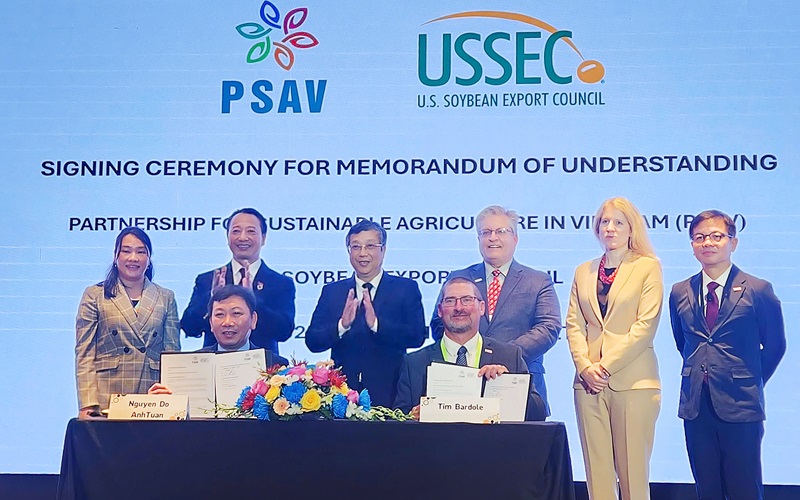
PSAV and USSEC sign MoU to boost agri-trade and sustainable supply chains between Vietnam and the U.S
At the signing ceremony, Mr. Nguyen Do Anh Tuan, Director General of the Department of International Cooperation under the Ministry, stressed that Vietnam and the U.S. are not direct competitors but rather complementary partners in agri-production and trade. Any unilateral intervention—such as tariffs—could harm both sides. The MoU is therefore a strategic mechanism for policy coordination, risk mitigation, and mutual benefit optimization.
Beyond trade facilitation, the MoU also covers technical transfer, human resource development, sustainable farming technologies, and public awareness campaigns such as the U.S. Soy Sustainability Assurance Protocol (SSAP). These components align with Vietnam’s vision for green agriculture and sustainable food system transformation.
Mr. Timothy Loh, Regional Director for Southeast Asia and Oceania at USSEC, reaffirmed Vietnam’s status as one of the most dynamic markets in the region and underscored USSEC’s long-term commitment to supporting Vietnam in its transition to modern, eco-friendly agriculture.
U.S. soybeans: A strategic link in Vietnam’s agri-value chain
Vietnam is currently the third-largest importer of U.S. soybeans in Southeast Asia and ranks 13th globally in soybean consumption. In the 2023–2024 crop year, Vietnam is expected to import approximately 2.2 million tons of whole soybeans and nearly 6 million tons of soybean meal—reflecting surging demand from the livestock, aquaculture, and food processing industries.
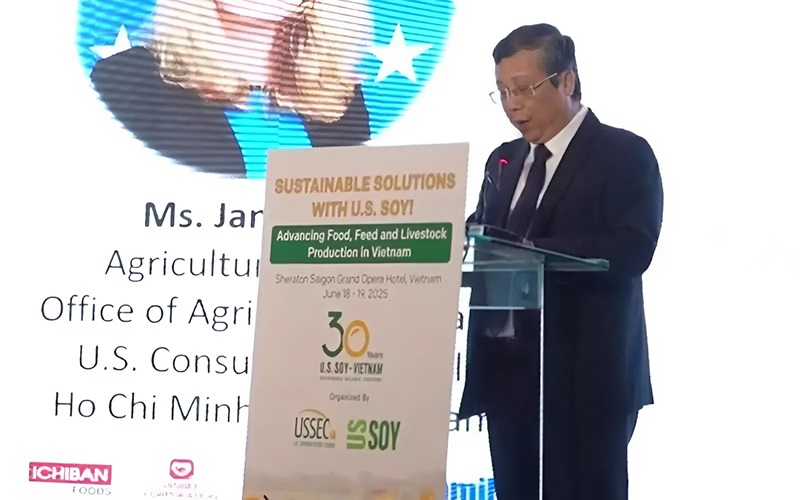
Deputy Minister Hoang Trung affirms U.S. soybeans as a top choice for Vietnam’s feed industry, vital to national food security
According to Deputy Minister Hoang Trung, soybeans are a strategic input in the production of animal and aquaculture feed—key sectors for national food security. U.S. soybeans, with their high protein content, consistent quality, and traceability, have long been the top choice of Vietnamese enterprises.
Ms. Tran My Hanh, USSEC’s Chief Representative in Vietnam, noted that over the past three decades, USSEC has worked across the entire supply chain—from importers and processors to distributors and end consumers. This sustained presence and long-term commitment have made a tangible contribution to the growth of Vietnam’s livestock and aquaculture industries.
Notably, Vietnam’s aquaculture sector now accounts for 4–5% of national GDP and plays an increasingly important role in international trade. The growing use of plant-based protein—particularly soy—in aquaculture feed not only meets demand for high-protein products but also supports environmental sustainability and productivity.
Strengthening the comprehensive strategic partnership through agriculture
The 30th anniversary of USSEC–Vietnam cooperation coincides with the celebration of 30 years of diplomatic ties between the two countries and the elevation of their relationship to a Comprehensive Strategic Partnership. Agriculture remains a cornerstone of bilateral relations, with agri-trade growing steadily at around 10% annually over the past decade.
According to Mr. Nguyen Quang Vinh, Vice President of the Vietnam Chamber of Commerce and Industry (VCCI), agriculture is a bright spot in U.S.–Vietnam economic relations. The U.S. currently has more than 1,150 investment projects in Vietnam with a total capital exceeding USD 10.4 billion. In 2024 alone, Vietnam imported nearly USD 1.5 billion worth of soybeans, corn, and animal feed ingredients from the U.S.
Mr. Jim Martin, Chief Executive Officer of USSEC, emphasized that long-term partnerships are at the core of U.S. soybean farmers’ global mission. Over the past 30 years, Vietnam has not only been a customer but a strategic partner in promoting sustainable production, improving food systems, and expanding markets for U.S. soy.
As the two countries continue to share a common supply chain, linkages among producers, consumers, and policymakers are becoming ever stronger. Robust support from both governments remains a key catalyst in building a modern, green, and inclusive agriculture sector—where Vietnam and the U.S. are not only trade partners, but global allies for sustainable development.
Minh Thao


